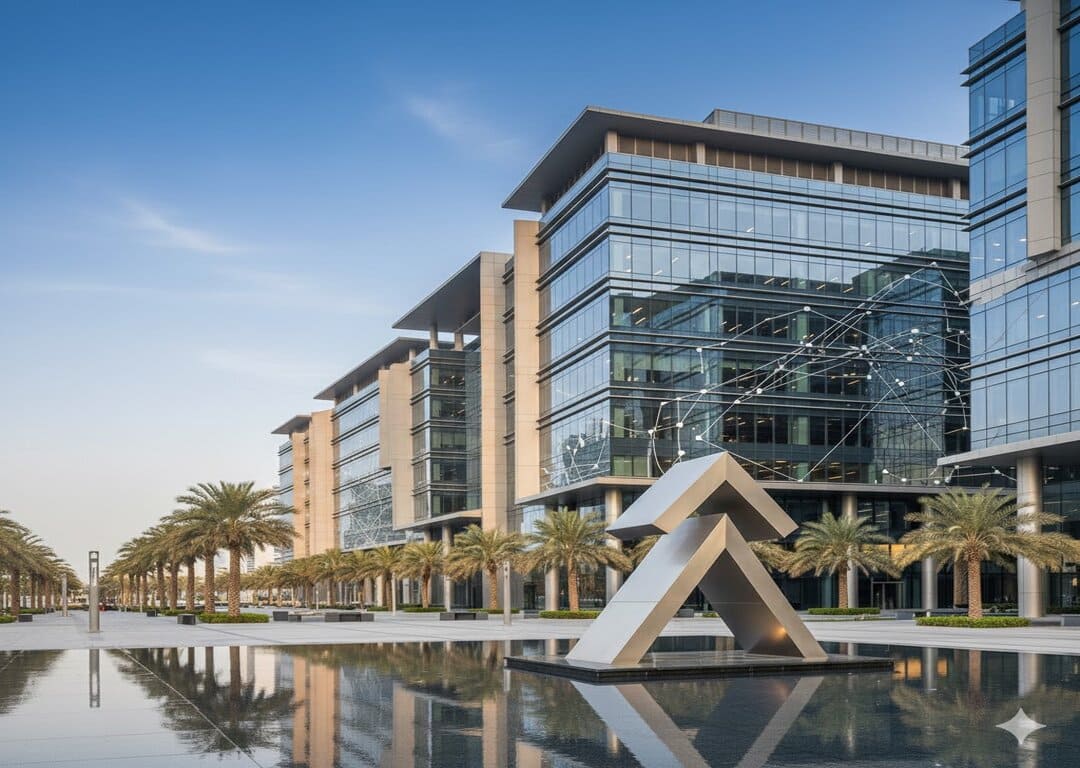DIFC fills the time-zone gap for a global financial centre between the leading financial centres of London and New York in the West and Hong Kong and Tokyo in the East.
Why setup a financial services firm in the DIFC?
The DIFC is a leading financial hub in the region. Besides offering a wide range of financial service activities, the centre also provides an integrated environment and world-class standard of living. It is well regarded in the international community as well.
There exist opportunities for startups as well. The recent focus on fintech led to the DIFC Fintech Hive initiative, that serves as an accelerator for fintech firms to test their products and pitch it to prospective investors. Sarwa (https://www.sarwa.co) is one such success story.
Specific Advantages:
Here are some specific advantages of establishing in the Dubai International Financial Centre:
LEGAL AND REGULATORY FRAMEWORK:
- Legal framework supports cross-border activities
- 100% foreign ownership permitted
- No restriction on foreign talent or employees
- No restrictions on capital repatriation
TAX BENEFITS:
- Zero tax for 50 years on profits, capital or assets from 2004
- Zero tax on employee income
COUNTERPARTY CONFIDENCE:
- Highly regarded, independent regulator
- Independent, English-speaking, common law judicial system
- Distinct from the UAE legal system
- Risk-based regulatory approach
DIVERSE ECOSYSTEM:
- Central to regional deal making
- High concentration of international firms, investment funds, wealth management firms, banks, and financial institutions
- World-class regional and international law and auditing firms, and other professional services
- The largest fund domicile in the region
GEOGRAPHIC EPICENTRE:
- Management offices, holding companies and family offices are located closer to the assets they own or manage
- The Middle East, Africa and South Asia (MEASA) is increasingly the centre of gravity for the global economy
- Dubai plays a central role in the growing South-South trade, principally between Asia and Africa
- Well-positioned to harness the potential of emerging markets
External Asset Manager:
External Asset Managers, or EAMs, are relationship managers of traditional banks, who set up on their own and in some cases, continue to work with the same banks as external relationship managers. Leading Swiss, American and European private banks have embraced the rise of an independent advisory segment by providing EAM desk coverage with dedicated relationship managers and cutting edge EAM IT platforms.
Advantages of the EAM Model:
- EAMs can set up and operate their own businesses and build up a credible brand in a few years time.
- EAMs do not have to meet sales targets. This helps them to focus on the long-term aspects of a client relationship, rather than short-term selling.
- Clients tend to be more comfortable with EAMs, since the relationship is more stable.
- EAMs tend to focus on client needs, rather than pushing financial products, and this leads to more bespoke and quality advice.
DIFC External Asset Manager License
- Setting up a Discretionary Asset Management License or
- Setting up as an Investment Advisor
Case 1 is usually a Category 3C Asset Management License. In this case, the EAM has complete control on the relationship with his client, under a discretionary mandate. However, the DFSA requirements are steeper in this case, with a base capital of US$ 500,000 required, among other things. You can read more here:
Requirements for a DIFC Category 3C Asset Manager License:
Alternatively, you can start with an entry-level Category 4 Investment Advisory License, that allows you to set up in an easier manner, get a track record, and then apply for an upgrade. You can read more here:
Requirements for a DIFC Category 4 Investment Advisor License:
In both cases, firms will have to apply to the DFSA for a Regulated License.
The DFSA has a fast-track process for Fund Manager licenses, which also come under Category 3C. The Fund Manager, if approved, can manage domestic professional ( Exempt and Qualified Investor Funds) and Foreign Funds in other jurisdictions as well. In case the firm wishes to also engage in discretionary portfolio management services, it has to go through a full-fledged license process.
DIFC Capital requirements
The base capital requirement for a Category 3C Asset Manager is US$ 500,000, and for a Category 4 Investment Advisor License is US$ 10,000. Actual capital required will depend on the nature, quantum of business and forecasted annual expenditure, as per the financial model of the proposed firm.
Costs:
Setting up a DIFC Regulated Firm involves the following interactions:
Dubai Financial Services Authority (DFSA):
The DFSA is responsible for reviewing and approving all applications for financial services. Costs depend on the activities applied for, which puts the applicant in one of five categories.
Generally, there are two components of DFSA fees. One – an application processing fee, and the other, an annual licensing fee.
Application fee: US$ 25,000 for an Asset Manager license application (US$ 15,000 for an Investment Advisory license)
License fee: from US$ 25,000 for an Asset Manager license application (US$ 15,000 for an Investment Advisory license)
Registrar of Companies (DIFC ROC):
The ROC helps to set up the legal structure of the DIFC Regulated Firm. Shareholders can be individual, or corporate. There are many options available, such as ‘Private Company Limited by Shares’ and ‘Limited Liability Partnerships’. In case of Private Company Limited by Shares, the costs for setting up include:
Application for reserving a name (2 working days): US$ 800
Application for Incorporation of a Private Company Limited by Shares (5 working days): US$ 8,000
Commercial License on Incorporation (5 working days): US$ 12,000 (annual fee)
Data Protection:
The data protection notification is part of the process of registering a new entity in the DIFC. The costs involved are as follows:
Registration - US$ 500
Annual renewal – US$ 250
Office spaces:
Every entity registered in the DIFC is required to lease a physical office. You can choose from the Gate and surrounding buildings, or other buildings within the DIFC, such as Emirates Financial Towers, Central Park, Park Avenue, Burj Daman and Currency House.
Prices vary, depending on the space availed and the building. Here is an indication of the prevailing rates:
DIFC Business Centre – from a two-desk office at US$ 35,000.
DIFC Fitted Offices – from US$ 55 per square foot.
Other buildings – from US$ 32,000 per annum
Visas:
Establishment Card Application – US$ 630
PSA Deposit – US$ 682
Visas (per visa) – from US$ 1,500
Our Services:
We provide turnkey services for DIFC External Asset Manager(EAM) License. From Fintech consulting, to assistance in authorisations, to assistance in preparation of the legal documentation, 10 Leaves helps you navigate the DFSA Rulebook and submit an application that is comprehensive, complete and compliant.
Our services include assistance in:
1. Reviewing the business model and advice on the applicable regulatory framework;
2. Preparation of the Regulatory Business Plan and comprehensive financial projections;
3. Preparation of all policies, processes and manuals required;
4. Provision of Outsourced Compliance Officer and Outsourced Finance Officer services;
5. Finalising the legal structure, including holding company setup and customisation of Memorandums; and
6. Finalisation of leased space, bank account opening and obtaining Financial Services Permissions.
Contact us to discuss more about DIFC External Asset Manager (EAM) License















 CONTACT
CONTACT